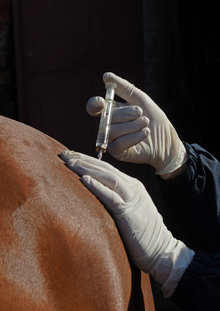As of November 16, 2015, three new cases of West Nile virus have been confirmed in Hernando County. A new case in Hernando County was confirmed on the November 12th with WNV. The horse had no previous vaccine or travel history within the past 4 weeks and was euthanized due to poor prognosis.

Vaccination = Best prevention of horse diseases
Itâs not too late this fall for horse owners to protect their horses against life-threatening mosquito-borne diseases and vaccination remains the most effective way to protect horses against West Nile virus and Eastern equine encephalitis.
© 2015 by Kondrashov MIkhail Evgenevich
Another horse had no vaccination history and one had been vaccinated but not within the past year. Both of these horses were euthanized due to poor prognosis. These are the fourth and fifth confirmed cases in Hernando County and the fifth and sixth positives in Florida since the beginning of the year.
Although the fall season is bringing cooler weather, veterinarians are warning horse owners in states where the weather is warmer of a continuing presence of infected mosquitoes whose bites lead to West Nile virus and other mosquito-borne diseases in horses and humans.
More than 130 different bird species are known to have been infected with West Nile, and more than 40 species of mosquito can carry the West Nile virus. The virus circulates through the mosquito's bloodstream and into its salivary glands. Then, when the mosquito bites a an animal, it transmits the virus into its bloodstream.
Horse owners are encouraged to get their horses vaccinated if they live in mosquito infected areas. Vaccination remains the most effective way to help protect horses against West Nile and other mosquito-borne diseases, such as Eastern equine encephalomyelitis (EEE) and Western equine encephalomyelitis (WEE).
Researchers recently tested horses' response to six West Nile virus vaccination regimens and found some substantial differences in their immune responses.7 While all of the vaccinated horses demonstrated an initial immune response, by Day 28, the antibody response of the horses vaccinated with WEST NILE-INNOVATOR® was four times higher than those vaccinated with the one-dose, big combination vaccines indicated for WNV.7
